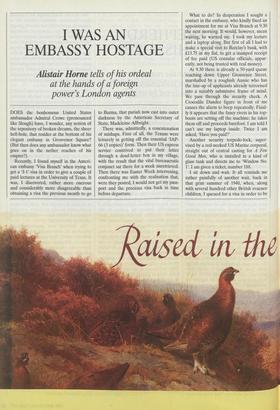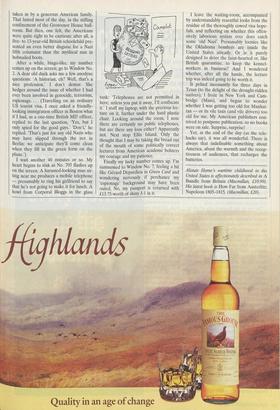I WAS AN EMBASSY HOSTAGE
Alistair Horne tells of his ordeal at the hands of a foreign power's London agents DOES the bonhomous United States ambassador Admiral Crowe (pronounced like Slough) have, I wonder, any notion of the repository of broken dreams, the sheer hell-hole, that resides at the bottom of his elegant embassy in Grosvenor Square? (But then does any ambassador know what goes on in the nether reaches of his empire?) Recently, I found myself in the Ameri- can embassy 'Visa Branch' when trying to get a `.1-1' visa in order to give a couple of paid lectures at the University of Texas. It was, I discovered, rather more onerous and considerably more disagreeable than obtaining a visa the previous month to go to Burma, that pariah now cast into outer darkness by the American Secretary of State, Madeleine Allbright.
There was, admittedly, a concatenation of mishaps. First of all, the Texans were leisurely in getting off the essential `IAP- 66 (3 copies)' form. Then their US express service contrived to put their letter through a dead-letter box in my village, with the result that the vital bureaucratic conjunct sat there for a week unretrieved. Then there was Easter Week intervening, confronting me with the realisation that, were they posted, I would not get my pass- port and the precious visa back in time before departure. What to do? In desperation I sought a contact in the embassy, who kindly fixed an appointment for me at Visa Branch at 9.30 the next morning. It would, however, mean waiting, he warned me. I took my lecture and a laptop along. But first of all I had to make a special visit to Barclay's bank, with £13.75 in my fist, to get a stamped receipt of fee paid (US consular officials, appar- ently, not being trusted with real money).
At 9.30 there is already a 50-yard queue reaching down Upper Grosvenor Street, marshalled by a roughish Aussie who has the line-up of applicants already terrorised into a suitably submissive frame of mind. We pass through the security check. A Crocodile Dundee figure in front of me causes the alarm to beep repeatedly. Final- ly it appears that the fancy rivets in his top- boots are setting off the machine; he takes them off and proceeds barefoot. I am told I can't use my laptop inside. Twice I am asked, 'Have you paid?'
Another security torpedo-lock, super- vised by a red-necked US Marine corporal, straight out of central casting for A Few Good Men, who is installed in a kind of glass tank and directs me to 'Window No. 1'. I am given a ticket, number 188.
I sit down and wait. It all reminds me rather painfully of another wait, back in that grim summer of 1940, when, along with several hundred other British evacuee children, I queued for a visa in order to be taken in by a generous American family. That lasted most of the day, in the stifling confinement of the Grosvenor House ball- room. But then, one felt, the Americans were quite right to be cautious: after all, a five- to 13-year-old British schoolchild pre- sented an even better disguise for a Nazi fifth columnist than the mythical nun in hobnailed boots.
After a while, bingo-like, my number comes up on the screen; go to Window No. 2. A dear old duck asks me a few anodyne questions: 'A historian, eh? Well, that's a nice profession.' I don't demur. She hedges around the issue of whether I had ever been involved in genocide, terrorism, espionage. . . . (Travelling on an ordinary US tourist visa, I once asked a friendly- looking immigration officer in Boston what if I had, as a one-time British MIS officer, replied to the last question, 'Yes, but I only spied for the good guys.' Don't,' he replied. 'That's just for any old Nazis who may have slipped through the net in Berlin: we anticipate they'll come clean when they fill in the green form on the plane.') I wait another 40 minutes or so. My heart begins to sink as No. 705 flashes up on the screen. A harassed-looking man sit- ting near me produces a mobile telephone — presumably to ring his girlfriend to say that he's not going to make it for lunch. A howl from Corporal Bloggs in the glass tank: 'Telephones are not permitted in here; unless you put it away, I'll confiscate it.' I stuff my laptop, with the precious lec- ture on it, further under the hard plastic chair. Looking around the room, I note there are certainly no public telephones, but are there any loos either? Apparently not. Next stop Ellis Island. Only the thought that I may be taking the bread out of the mouth of some politically correct lecturer from American academe bolsters my courage and my patience. Finally my lucky number comes up. I'm summoned to Window No. 7, feeling a bit like Gerard Depardieu in Green Card and wondering nervously if perchance my 'espionage' background may have been outed. No, my passport is returned with 113.75-worth of shiny J-1 in it. I leave the waiting-room, accompanied by understandably resentful looks from the residue of the thoroughly cowed visa hope- fuls, and reflecting on whether this offen- sively laborious system ever does catch some 'old Nazi'. Presumably loonies like the Oklahoma bombers are inside the United States already. Or is it purely designed to deter the faint-hearted or, like British quarantine, to keep the kennel- workers in business? And I wondered whether, after all the hassle, the lecture trip was indeed going to be worth it.
It pelted incessantly for three days in Texas (to the delight of the drought-ridden natives); I froze in New York and Cam- bridge (Mass), and began to wonder whether I was getting too old for Manhat- tan — or its vile taxis (and vile drivers) too old for me. My American publishers con- trived to postpone publication, so no books were on sale. Surprise, surprise!
Yet, at the end of the day (as the tele- hacks say), it was all wonderful. There is always that indefinable something about America, about the warmth and the recep- tiveness of audiences, that recharges the batteries.
Alistair Home's wartime childhood in the United States is affectionately described in A Bundle from Britain (Macmillan, L10.99). His latest book is How Far from Austerlitz; Napoleon 1805-1815, (Macmillan, 00).











































































 Previous page
Previous page